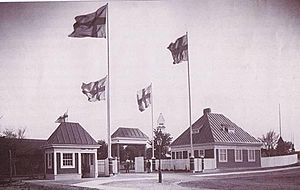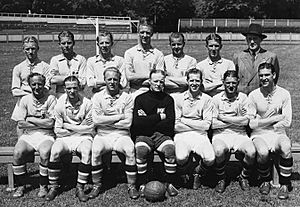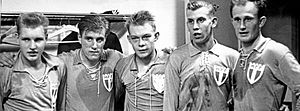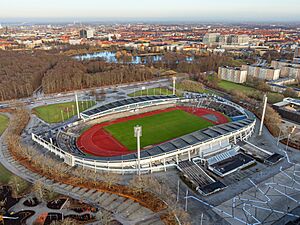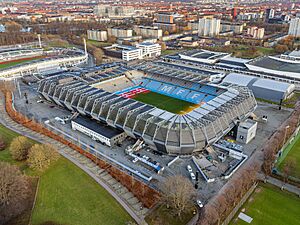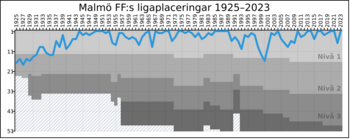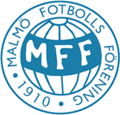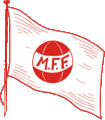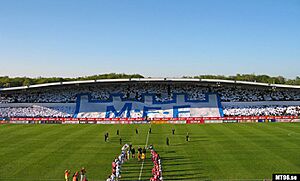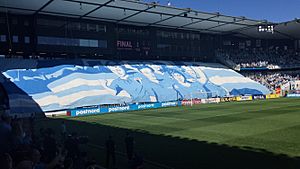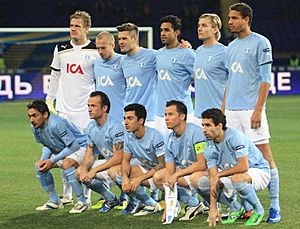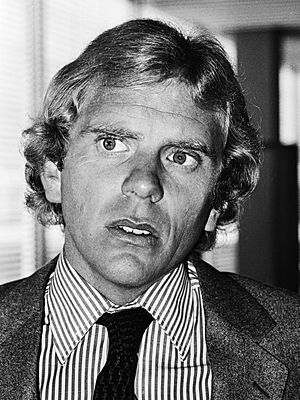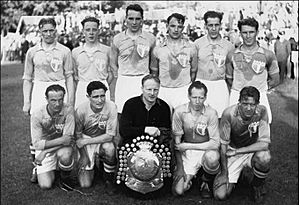Malmö FF facts for kids
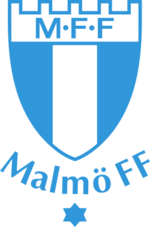 |
||||
| Full name | Malmö Fotbollförening (Malmö) | |||
|---|---|---|---|---|
| Nickname(s) | Sveriges mest framgångsrika klubb (Sweden's most successful club) Den svenska rekordhållaren (The Swedish Record) Di blåe (The Blue Ones) Himmelsblått (Sky Blue) |
|||
| Short name | MFF | |||
| Founded | 24 February 1910 | |||
| Ground | Eleda Stadion, Malmö | |||
| Capacity | 22,500 | |||
| Chairman | Anders Pålsson | |||
| Head coach | Henrik Rydström | |||
| League | Allsvenskan | |||
| 2024 | Allsvenskan, 1st of 16 (champions) | |||
|
||||
Malmö Fotbollförening, often called Malmö FF or MFF, is a professional football club from Malmö, Scania, Sweden. They play in the Allsvenskan, which is the top football league in Sweden. Their home games are played at Eleda Stadion.
Malmö FF is Sweden's most successful football club. They have won 24 Swedish championships and 16 Svenska Cupen titles. Both of these are national records.
The club started in 1910. They won their first national championship in 1944. The 1970s was a very successful time for them. During this decade, they won five Swedish championships and four Svenska Cupen titles. They also became the only team from the Nordic countries to reach a European Cup or UEFA Champions League final. They lost 1–0 to the English club Nottingham Forest in the 1979 final. For this amazing achievement, Malmö FF received the Svenska Dagbladet Gold Medal.
Malmö FF also became the only Nordic team to play in the Intercontinental Cup in 1979. This tournament was the earlier version of the FIFA Club World Cup. The club is also at the top of the overall Allsvenskan table, meaning they have won the most matches in the league's history. They have also scored the most goals.
Malmö FF is nicknamed Di blåe, which means "The Blue Ones" in the Scanian language. Their team colors are sky blue and white. Their home kit has sky blue shirts, white shorts, and sky blue socks. They have two big rivalries: a local derby with Helsingborg and a strong competition with IFK Göteborg. They also have a historical rivalry with IFK Malmö. Their official fan club is called MFF Support.
Contents
Club History
How Malmö FF Started
The club began in 1905 when the city of Malmö encouraged young people to play organized football. One youth team, Bollklubben Idrott (BK Idrott), was a key part of Malmö FF's beginnings. BK Idrott joined IFK Malmö in 1909 but soon left due to disagreements.
On February 24, 1910, 19 members of BK Idrott started Malmö FF. Werner Mårtensson was the first chairman. For the first ten years, the club played in local and regional leagues. They often played in the Malmömästerskapen city division. They also competed in regional games in Scania and played against Danish clubs.
In 1916, Malmö FF reached the final of the Scanian regional competition for the first time. They played against their rivals Helsingborgs IF but lost 3–4. That season, the club beat local rivals IFK Malmö three times. This earned them the unofficial title of Malmö's best football club. In 1917, Malmö FF played in the Svenska Mästerskapet for the first time. This was a cup tournament to decide the Swedish champions. They lost their first match 4–1 against IFK Malmö. The club continued to play in this cup until 1922. They reached the quarter-finals in 1920 but were knocked out by Landskrona BoIS. The cup was later stopped. The title of Swedish champions then went to the winners of the Allsvenskan, which started in the 1924–25 season.
In 1920, the Swedish Football Association invited clubs to play in official national competitions. Malmö FF joined Division 2 Sydsvenska Serien. They won this division in their first season and were promoted to Svenska Serien Västra. This was the highest level of football in Sweden then. However, they were relegated after just one season. They returned to Sydsvenska Serien for almost ten years until they were promoted to Allsvenskan in 1931.
First Championships and Success
The club finished in the middle of the league for two seasons. But in 1934, they were sent down to a lower league. This happened because they had paid their players small amounts of money for each game. This was against the rules for amateur clubs, even though many clubs did it. Malmö FF was the only club that showed these payments in their records. Besides being relegated, the club's entire board and 26 players were banned. Malmö FF and local newspapers believed that their rival, IFK Malmö, had reported them. This event added to the strong rivalry between the two clubs.
Malmö FF returned to the Allsvenskan in 1937 after two seasons in Division 2. In the same year, Eric Persson became chairman. He had been the secretary since 1929 and stayed chairman until 1974. Many people see Persson as the most important person in the club's history. He helped the club become professional in the 1970s. Under his leadership, the club went from having no titles in 1937 to winning ten Swedish championships by the end of 1974. In 1939, the club reached its highest position yet, third place in the Allsvenskan. They were nine points behind the champions IF Elfsborg.
Malmö FF won their first Swedish championship in 1944. They won the second-to-last game of the season against AIK in front of 36,000 fans at the Råsunda stadium. They won the last game of the season 7–0 against Halmstad BK.
For the next nine seasons, Malmö FF always finished in the top three in the league. The club won the Swedish Championship in 1949, 1950, 1951, and 1953. They were runners-up in 1946, 1948, and 1952. The club also won the Svenska Cupen in 1944, 1946, 1947, 1951, and 1953. They were runners-up in 1945. Between May 6, 1949, and June 1, 1951, the team went unbeaten for 49 matches. This included a streak of 23 straight victories.
The club finished second in the Allsvenskan two more times, in 1956 and 1957. The next year, the club moved from Malmö IP to Malmö Stadion. This stadium was built for the 1958 FIFA World Cup. Malmö FF played there for 50 years. In 1964, Malmö FF hired Spanish manager Antonio Durán. This was one of many changes that led to the club's most successful time. Young talents like Lars Granström and Bo Larsson became important players in the early 1960s. They were key to the success in the 1970s. The club finished second in 1964. Then, they won their sixth Swedish Championship in 1965. Bo Larsson scored 28 goals that year, becoming the league's top scorer. Malmö FF won the Allsvenskan again in 1967. The club's young players and new talents from nearby clubs in Scania formed a team that consistently finished in the top three in the Allsvenskan.
The Golden Era: 1970s and European Cup Final
After finishing second in Allsvenskan in the last two years of the 1960s, Malmö FF began their most successful decade. They won the Swedish Championship in 1970. The club won Allsvenskan in 1970, 1971, 1974, 1975, and 1977. They also won Svenska Cupen in 1976 and 1978.
The 1977 Allsvenskan win allowed the club to play in the 1978–79 European Cup. After beating teams like AS Monaco, Dynamo Kyiv, Wisła Kraków, and Austria Wien, Malmö FF reached the final. The final was played at the Olympiastadion in Munich against Nottingham Forest. Trevor Francis scored the only goal, and Nottingham Forest won 1–0. Even though they lost, the 1979 European Cup run is the biggest success in Malmö FF's history. The team received the Svenska Dagbladet Gold Medal that year for their amazing achievement.
Much of the success in the 1970s came from new tactics and training methods. These were brought to the club by English manager Bob Houghton, who coached the team from 1974 to 1980. Eric Persson was replaced as chairman in 1974 by Hans Cavalli-Björkman.
After some good performances in the early 1980s, Roy Hodgson became manager in 1985. Roy Hodgson led Malmö FF to two Swedish Championships in 1986 and 1988. The club won Allsvenskan five years in a row from 1985 to 1989. At that time, the championship was decided by play-offs after the regular season. This system was used from 1982 to 1992. The club reached the play-off final four times between 1986 and 1989, winning twice. Besides Allsvenskan and Swedish Championships, Malmö FF won Svenska Cupen in 1984, 1986, and 1989.
The team did not do as well in the 1990s, except for finishing second in Allsvenskan in 1996. They did not win Allsvenskan or Svenska Cupen during this decade. The 1990s ended with them being relegated from Allsvenskan in 1999. Hans Cavalli-Björkman was replaced as chairman by Bengt Madsen in 1999. Former player Hasse Borg became the Director of Sport. These changes, along with the rise of young talent Zlatan Ibrahimović, helped the club return to Allsvenskan in 2001. Ibrahimović became famous and was a key player in Malmö FF's return to the top league. He was later sold to Ajax in 2001. He then played for many big European clubs before retiring in 2023.
Modern Era: 2000s to Today
Returning to Allsvenskan marked a successful period in the early 2000s. Under manager Tom Prahl, the club finished in the top three for three years in a row. In 2004, they won Allsvenskan, their fifteenth Swedish Championship. In 2005, the club reached the final qualifying round for the UEFA Champions League but lost to FC Thun.
Good sponsorship and player sales made Malmö FF the richest club in Sweden. This was further strengthened by playing in the Champions League group stage in the next two years. Malmö FF moved from Malmö Stadion to Eleda Stadion in 2009. This new stadium was built just for football and is next to the old one.
In 2009, Madsen announced he would step down as chairman. Håkan Jeppsson replaced him early the next year. In 2010, the club celebrated its 100th anniversary with many events. On the anniversary day, the Swedish football magazine Offside called Malmö FF the greatest football club in Swedish history. The season was a big success as the club won Allsvenskan for the nineteenth time and became Swedish champions for the sixteenth time. Unlike in 2004, these wins were achieved without big player transfers. The team mostly had younger players.
In October 2013, Malmö FF won their seventeenth Swedish championship and 20th Allsvenskan title. They won it in the second-to-last game of the league season. Like in 2010, a young team achieved this title. The average age of the squad was 23.8 years, making them the youngest champions since 2000. The next year, Malmö FF qualified for the group stage of the 2014–15 UEFA Champions League. They beat Ventspils, Sparta Prague, and Red Bull Salzburg in the qualifying rounds. This was the first time the club qualified for the main competition since it was renamed from the European Cup in 1992–93. It was also the first time a Swedish club qualified since the 2000–01 season. In the following months, Malmö FF won their league title again. They won their eighteenth Swedish championship and 21st Allsvenskan title. This was the first time a club had defended the Allsvenskan title since the 2003 season.
In the 2015 season, Malmö FF did not win the title and missed the top four for the first time since 2009. However, the club qualified again for the UEFA Champions League group stages in the 2015–16 UEFA Champions League season. They beat Žalgiris Vilnius, Red Bull Salzburg, and Celtic in the qualifiers. In October 2016, Malmö FF won their nineteenth Swedish championship and 22nd Allsvenskan title. This was Malmö FF's third title in four years. This meant the club passed IFK Göteborg in Swedish championship titles. They became the most successful Swedish football club ever in terms of domestic titles.
The 2020s have brought more national success to the club. They won the Allsvenskan in 2020, 2021, 2023, and 2024. This brought their total league titles to 27. They also reached the Champions League group stage in the 2021–22 season. They reached the knockout stages of the UEFA Europa League in 2019–20. These successes happened under the management of Jon Dahl Tomasson and Henrik Rydström.
Malmö FF is a very strong team in Sweden. As of the end of the 2021 Allsvenskan season, the club leads the overall Allsvenskan table. Malmö FF also holds the records for the most Swedish championships, Allsvenskan titles, and Svenska Cupen titles.
Team Colors and Crest
Because of their sky blue and white colors, the club is often called Di blåe (The Blues) and Himmelsblått (The Sky Blues). Their home kit is sky-blue shirts, white shorts, and sky-blue socks. The away kit is black. Sometimes, other kits have been used for European games. For example, an all-white kit was used in the 1950s and again in 2011 and 2012. All-black kits with sky-blue and gold details were used for European games in 2005 and 2013.
Kit Design Over Time
|
|
|
The club colors were not always sky blue. The earlier club, BK Idrott, wore blue and white striped shirts and white shorts. This kit was used for the first six months of 1910 after Malmö FF started. Later, the colors changed to red and white striped shirts and black shorts. This was to show that Malmö FF was a new, independent club. These red and white colors have sometimes been used as the away kit in modern times. The current sky-blue kit was introduced in 1920. Since 2010, a small Scanian flag has been on the back of the shirt, just below the neck.
Crest Design Over Time
Malmö FF's crest is a shield with two vertical sky-blue sections on the sides and a white section in the middle. Below the shield, "Malmö FF" is written in sky-blue letters with a sky-blue star underneath. At the top of the shield, there is a white horizontal section above the three vertical ones. The club's abbreviation, "MFF," is written in sky-blue letters in this section. On top of the shield are five tower-like shapes from the white section.
The current shield crest first appeared on the shirt in the 1940s. There were other crests before this, but they were never on the shirt. The first crest was black and white. The second crest was red and white, matching the club's main colors between 1910 and 1920.
In the original shield logo, the full club name and sky-blue star were not included. They were added later when chairman Eric Persson found that people abroad had trouble knowing which city the club was from just by looking at the crest. The six-pointed star comes from the oldest seal of the City of Malmö.
For the club's 100th anniversary in 2010, the years 1910 and 2010 were shown on each side of the shield on a sky-blue ribbon behind it.
Malmö FF is the only Swedish club to wear two stars above its crest. These stars mean the club has won at least 20 national championship titles. The stars are only on the match shirts and are not part of the club's official crest.
Supporters
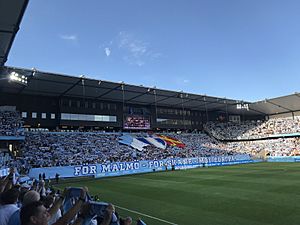
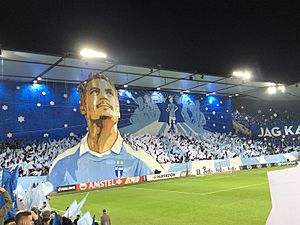
Malmö FF has several fan clubs. The largest is the official fan club MFF Support, started in 1992. MFF Support says it is "a non-profit and non-political organization working against violence and racism." The chairman of MFF Support is Thelma Ernst.
There are also smaller, independent supporter groups. The most well-known is Supras Malmö, formed in 2003. This group was created by smaller ultras groups and dedicated fans. The name "Supras" comes from "supporters" and "ultras." The "ultras" part means the group is inspired by a fan culture from southern Europe. Supras Malmö is the most visible group in the main supporter stand at Eleda Stadion. They show their presence with banners, flags, and special displays called choreography. Another group with similar goals is Rex Scania. MFF Tifosi 96 (MT96) is a group of supporters who create tifos for special events and important games. Malmösystrar (Sisters of Malmö) is the largest female supporter group in Europe, with over 200 members.
Malmö FF supporters have a friendship with the supporters of Hertha BSC.
Team Rivalries
Because they are close geographically, Malmö FF has smaller rivalries with Trelleborgs FF and Landskrona BoIS. Both of these clubs are also in Scania. The main rivals of the club are Helsingborgs IF, IFK Göteborg, and IFK Malmö.
The rivalry between Malmö FF and Helsingborgs IF started when Malmö FF was promoted to Allsvenskan in the 1930s. This rivalry is mainly because both teams are from Scania in southern Sweden. The rivalry with IFK Göteborg is more about competing for titles. These two are the most successful clubs in Swedish football history. They are also the only two Swedish clubs to have played in European cup finals. IFK Göteborg played in the UEFA Cup finals in 1982 and 1987. Malmö FF played in the European Cup final in 1979.
In the 2000s, a rivalry between Malmö FF and FC Copenhagen has grown stronger. This rivalry is mainly due to their close location and playing against each other more often. During a match in the Royal League in 2005 in Copenhagen, the game became more intense. This happened after Danish police, for unclear reasons, used batons on Malmö supporters in the stands.
The rivalry with IFK Malmö is both geographical and historical. Both clubs are from the same city and used to play at the same stadium in the early 1900s. It is believed that IFK Malmö board members reported Malmö FF for breaking amateur football rules in 1933. This event further increased the tension between the two clubs. IFK Malmö has not played in Allsvenskan since 1962, so matches between the two teams are rare.
Fan Attendance at Games
Malmö FF is known for its large number of fans at games. Here are the average attendances at Malmö FF's home matches in Allsvenskan and European competitions for the last ten seasons.
| Season | Stadium | Capacity | Total | High | Low | Average | Occupancy | Median |
|---|---|---|---|---|---|---|---|---|
| 2010 | Eleda Stadion | 24,000 | 227,904 | 24,148 | 9,346 | 15,194 |
63.3% | 14,149 |
| 2011 | 185,825 | 23,612 | 6,715 | 12,388 |
51.6% | 11,333 | ||
| 2012 | 221,981 | 23,638 | 10,088 | 14,799 |
61.7% | 14,583 | ||
| 2013 | 241,395 | 23,758 | 9,837 | 16,093 |
67.1% | 15,560 | ||
| 2014 | 211,357 | 20,310 | 9,336 | 14,090 |
58.7% | 13,382 | ||
| 2015 | 22,500 | 259,973 | 22,337 | 12,862 | 17,332 |
77.0% | 16,215 | |
| 2016 | 267,622 | 21,719 | 13,747 | 17,841 |
79.3% | 17,526 | ||
| 2017 | 273,807 | 21,354 | 14,482 | 18,254 |
81.1% | 18,830 | ||
| 2018 | 223,822 | 20,072 | 11,237 | 14,921 |
66.3% | 14,745 | ||
| 2019 | 248,496 | 21,812 | 11,521 | 16,566 |
73.6% | 16,267 | ||
| 2020 | 0 | 0 | 0 | 0 |
0% | 0 | ||
| 2021 | 108,115 | 21,067 | 0 | 7,208 |
32.0% | 5,113 | ||
| 2022 | 261,156 | 20,231 | 13,312 | 17,410 |
77.4% | 17,052 | ||
| 2023 | 301,126 | 21,612 | 17,116 | 20,075 |
89.2% | 20,231 | ||
| 2024 | 304,320 | 21,576 | 19,173 | 20,288 |
90.2% | 20,118 |
| Season | Competition | Capacity | Matches | Total | High | Low | Average |
|---|---|---|---|---|---|---|---|
| 2011–12 | UEFA Champions League | 20,500 | 3 | 46,916 | 19,084 | 12,501 | 15,639 |
| 2011–12 | UEFA Europa League | 3 | 26,900 | 10,802 | 7,632 | 8,967 | |
| 2013–14 | UEFA Europa League | 3 | 25,855 | 11,538 | 5,689 | 8,618 | |
| 2014–15 | UEFA Champions League | 6 | 110,014 | 20,500 | 8,831 | 18,336 | |
| 2015–16 | UEFA Champions League | 6 | 113,958 | 20,500 | 12,436 | 18,993 | |
| 2017–18 | UEFA Champions League | 1 | 20,058 | 20,058 | 20,058 | 20,058 | |
| 2018–19 | UEFA Champions League | 3 | 45,985 | 18,153 | 10,623 | 15,328 | |
| 2018–19 | UEFA Europa League | 5 | 82,692 | 20,312 | 11,487 | 16,538 | |
| 2019–20 | UEFA Europa League | 8 | 125,471 | 20,500 | 8,667 | 15,684 | |
| 2020–21 | UEFA Europa League | 3 | 0 | 0 | 0 | 0 | |
| 2021–22 | UEFA Champions League | 7 | 61,522 | 19,551 | 4,012 | 8,789 | |
| 2022–23 | UEFA Champions League | 2 | 29,064 | 17,234 | 11,830 | 14,532 | |
| 2022–23 | UEFA Europa League | 5 | 64,029 | 16,057 | 10,912 | 12,806 | |
| 2024–25 | UEFA Champions League | 3 | 57,679 | 20,589 | 18,432 | 19,226 |
Stadiums Where Malmö FF Plays
Malmö FF's first stadium was Malmö IP. They shared it with their rivals IFK Malmö. The team played here from when the club started in 1910 until 1958. The stadium is still used today, but it has a smaller capacity. It is now used by the women's team FC Rosengård, which used to be part of Malmö FF. In 2012, its capacity was 7,600. However, many more fans used to attend when Malmö FF played there. In their last season at Malmö IP in 1957, the average attendance was 15,500. The club's record attendance at Malmö IP was 22,436 against Helsingborgs IF on June 1, 1956. This stadium is still important to the club's history. It is where the club was founded, played for 47 seasons, and won five Swedish championships.
A new stadium was built in Malmö after Sweden was chosen to host the 1958 FIFA World Cup. This new stadium was Malmö Stadion. Malmö FF played their first season there in 1958. The first time the club won the Swedish championship at this stadium was in 1965. An upper seating area was added to the stadium in 1992. The club had its most successful period at this stadium. They won ten out of their twenty Swedish championships while playing there. The stadium originally held 30,000 people, but this was reduced to 27,500 due to new safety rules. The club's record attendance at Malmö Stadion was 29,328 against Helsingborgs IF on September 24, 1967.
After winning the 2004 Allsvenskan, plans were made to build a new stadium. In July 2005, Malmö FF announced that work would begin on Eleda Stadion. This stadium was designed for 18,000 seated fans and 6,000 standing fans. It can also hold 21,000 seated fans for international and European games where standing areas are not allowed. Construction started in 2007 and finished in 2009. The new stadium is located next to Malmö Stadion.
Even though some small construction was still happening, the stadium opened on April 13, 2009. The first home game of the 2009 season was against Örgryte IS. Malmö FF's Labinot Harbuzi scored the first goal in the 61st minute. The first Swedish championship won at this stadium was in 2010. The club beat Mjällby AIF 2–0 on November 7 in the final game of the season. Attendance at this game set the stadium record of 24,148. Eleda Stadion is a UEFA category 4 rated stadium.
Malmö FF in European Football
Malmö FF has a rich history in European football. They have played in UEFA competitions since 1964. The club's best European performance was in the 1978–79 season. They reached the final of the UEFA Champions League (then called the European Champion Clubs' Cup). They lost 0–1 to English champions Nottingham Forest. This makes Malmö FF the only Nordic club to have gone this far in the European Cup or Champions League.
Malmö FF is also the only Nordic club to have played in the Intercontinental Cup in 1979. This tournament was later replaced by the FIFA Club World Cup. Malmö FF is one of only four Swedish clubs to have played in the UEFA Champions League group stages. The others are IFK Göteborg, AIK, and Helsingborg.
Overall European Record
| Tournament | S | Pld | W | D | L | GF | GA | GD |
|---|---|---|---|---|---|---|---|---|
| European Champion Clubs' Cup / UEFA Champions League | 19 | 95 | 32 | 23 | 40 | 103 | 148 | −45 |
| UEFA Cup / UEFA Europa League | 17 | 80 | 34 | 15 | 31 | 122 | 97 | +25 |
| Cup Winners' Cup | 5 | 22 | 9 | 7 | 6 | 35 | 18 | +17 |
| Inter-Cities Fairs Cup | 4 | 8 | 0 | 1 | 7 | 4 | 23 | −19 |
| UEFA Intertoto Cup | 1 | 2 | 0 | 0 | 2 | 1 | 4 | −3 |
| Intercontinental Cup / FIFA Club World Cup | 1 | 2 | 0 | 0 | 2 | 1 | 3 | −2 |
| Total | 45 | 197 | 70 | 43 | 83 | 247 | 273 | −26 |
UEFA Club Ranking
This table shows Malmö FF's position in the UEFA club ranking for 2024. It also shows the clubs closest to Malmö FF's position.
| 2024 | 2023 | Mvmt. | Club | 2019–20 | 2020–21 | 2021–22 | 2022–23 | 2023–24 | 2024 Coeff. |
|---|---|---|---|---|---|---|---|---|---|
| 86 | 83 | 3.00 | 14.00 | 2.00 | 19.000 | ||||
| 87 | 103 | 2.50 | 4.00 | 5.00 | 2.00 | 5.00 | 18.500 | ||
| 87 | 63 | 8.00 | 2.50 | 5.00 | 1.50 | 18.500 | |||
| 89 | 102 | 2.50 | 18.056 | ||||||
| 60 | 134 | 2.50 | 2.50 | 4.00 | 9.00 | 18.000 |
Club Ownership and Money
Malmö FF changed from an amateur club to a fully professional one in the late 1970s. This happened under the leadership of chairman Eric Persson. The club is an open member association. This means that members vote at the annual general meeting, and each member has one vote. No shares are sold. The meeting approves the club's financial reports, elects the chairman and board, and decides on new ideas. During the successful 2010s, Håkan Jeppsson was the chairman after taking over from Bengt Madsen in 2010. He passed away suddenly in 2018. The club's legal status means that any financial claims are made against the club itself, not against the board or members. A managing director runs the daily operations and works with the chairman.
With 497 million SEK in assets, Malmö FF was the richest football club in Sweden as of 2019. Their income for 2018 was 343 million SEK. The highest amount of money Malmö FF received for selling a player was 86.2 million SEK (about €8.7 million at that time). This was for Zlatan Ibrahimović when he was sold to Ajax in 2001. At that time, it was the highest transfer fee ever paid to a Swedish football club.
Malmö FF's main sponsors include Volkswagen, Elitfönster AB, Intersport, Imtech, JMS Mediasystem, Mercedes-Benz, SOVA, and Svenska Spel. The club also had a deal with Swedbank for the naming rights of Eleda Stadion between 2007 and 2017. During that time, it was called Swedbank Stadion.
Malmö FF in Media
Malmö FF has been the subject of several films. Some examples are the Swedish football documentaries Blådårar 1 and Blådårar 2. These films show the club from the perspective of both fans and players during the 1997 and 2000 seasons. Blådårar 1 is set in 1997, when the club finished third in Allsvenskan. The film focuses on a dedicated fan named Lasse, player Anders Andersson, former chairman Hans Cavalli-Björkman, and others. Blådårar 2 is set in 2000, the year after the club was relegated to Superettan. It follows the team as they try to get Malmö FF back into Allsvenskan. The second film continues to follow Lasse, but also focuses a lot on Zlatan Ibrahimović. It shows his progress and how he was eventually sold to AFC Ajax during the 2001 season.
The club has also been featured in Mitt Hjärtas Malmö, a series of documentaries about Malmö's history. These included old match footage from the 1940s (Volume 7). They also showed footage from the 1979 European Cup Final in Munich from a fan's point of view (Volume 8). Volume 9 of the series is all about the club's 100th anniversary in 2010.
In the 2005 Swedish drama movie Om Sara, actor Alexander Skarsgård plays a fictional football star named Kalle Öberg, who plays for Malmö FF. Finally, a repeated sketch in the second season of the comedy show Hipphipp! featured a group of Malmö FF fans singing and chanting while doing everyday things, like shopping or using an ATM.
Players
Current Team Squad
|
|
Players on Loan
|
|
Retired Jersey Numbers
12 – MFF Support (This number is retired in honor of the fans.)
Famous Players of Malmö FF
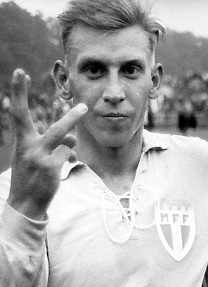
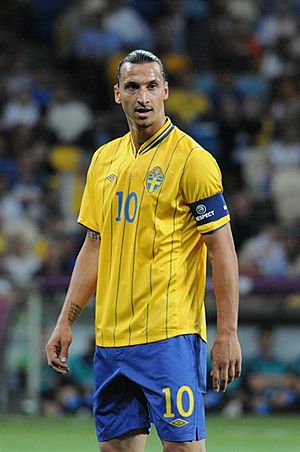
Here are some notable players from Malmö FF's history:
- Players who have played more than 500 games for the club.
- Players who have won the Guldbollen (Swedish Footballer of the Year award) or an official UEFA or FIFA award.
- Players chosen as one of the 11 best players in the official hall of fame Sydsvenskan team. This team was selected by newspaper readers for the club's 100th anniversary in 2010.
| Name | Nationality | Malmö FF career |
Total appearances |
Total goals |
Guldbollen | UEFA/FIFA Award | Sydsvenskan team |
|---|---|---|---|---|---|---|---|
| Erik Nilsson | Sweden | 1934–1953 | 600 | 4 | 1950 | ||
| Helge Bengtsson | Sweden | 1934–1951 | 501 | 3 | |||
| Prawitz Öberg | Sweden | 1952–1965 | 515 | 103 | 1962 | ||
| Ingvar Svahn | Sweden | 1957–1968 1970 |
414 | 161 | 1967 | ||
| Bo Larsson | Sweden | 1962–1966 1969–1979 |
546 | 289 | 1965 1973 |
Yes | |
| Krister Kristensson | Sweden | 1963–1979 | 626 | 16 | Yes | ||
| Roy Andersson | Sweden | 1968–1983 | 624 | 49 | 1977 | Yes | |
| Roland Andersson | Sweden | 1968–1974 1977–1983 |
564 | 13 | |||
| Jan Möller | Sweden | 1971–1980 1984–1988 |
591 | 1 | 1979 | Yes | |
| Ingemar Erlandsson | Sweden | 1976–1987 | 473 | 46 | Yes | ||
| Magnus Andersson | Sweden | 1975–1988 | 568 | 28 | |||
| Robert Prytz | Sweden | 1977–1982 1993–1995 |
132 | 36 | 1986 | Yes | |
| Torbjörn Persson | Sweden | 1980–1995 | 574 | 39 | |||
| Jonnie Fedel | Sweden | 1984–2001 | 588 | 1 | |||
| Jonas Thern | Sweden | 1985–1987 1988–1989 |
160 | 30 | 1989 | Yes | |
| Martin Dahlin | Sweden | 1987–1991 | 176 | 83 | 1993 | Yes | |
| Stefan Schwarz | Sweden | 1987–1991 | 103 | 7 | 1999 | Yes | |
| Patrik Andersson | Sweden | 1989–1992 2004–2005 |
184 | 24 | 1995 2001 |
UEFA Team of the Year 2001 |
Yes |
| Zlatan Ibrahimović | Sweden | 1999–2001 | 69 | 16 | 2005 2007–2016 |
UEFA Team of the Year 2007 2009 2013 2014 FIFPro World XI 2013 FIFA Puskás Award 2013 |
Yes |
| Jari Litmanen | Finland | 2005–2007 | 18 | 6 | UEFA Jubilee Awards | ||
| Emil Forsberg | Sweden | 2013–2014 | 57 | 19 | 2021 |
Club Management
Club Organization
As of January 8, 2024
| Name | Role |
|---|---|
| President | |
| Chief executive officer | |
| Secretary | |
| Sporting director | |
| Assistant sporting director | |
| Sporting assistant | |
| Chief Scout | |
| Technical manager | |
| Sporting co-ordinator | |
| Sporting director (youth) | |
| Chief scout (youth) |
Coaching Staff
As of July 22, 2025
| Name | Role |
|---|---|
| Head coach | |
| Assistant coaches | |
| Analysts | |
| Fitness coaches | |
| Goalkeeping coach | |
| Physiotherapists | |
| Club doctor | |
| Club masseur | |
| Psychologist | |
| Equipment manager |
Famous Coaches Who Won Titles
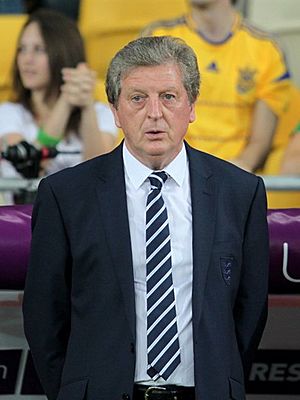
This is a list of coaches who have won one or more titles with the club:
| Name | Years | Allsvenskan | Svenska Cupen |
|---|---|---|---|
| 1944 1945–1946 1950 |
1943–44 1949–50 |
1944 1946 |
|
| 1947–1949 | 1948–49 | 1947 | |
| 1951–1954 | 1950–51 1952–53 |
1951 1953 |
|
| 1964–1971 | 1965 1967 1970 1971 |
1967 | |
| 1972–1973 | 1972–73 | ||
| 1974–1980 1990–1992 |
1974 1975 1977 |
1973–74 1974–75 1977–78 1979–80 |
|
| 1983–1984 | 1983–84 | ||
| 1985–1989 | 1985 1986 1987 1988 1989 |
1985–86 1988–89 |
|
| 2002–2005 | 2004 | ||
| 2008–2011 | 2010 | ||
| 2011–2013 | 2013 | ||
| 2014–2015 | 2014 | ||
| 2016 | 2016 | ||
| 2017–2018 | 2017 | ||
| 2020–2021 | 2020 2021 |
||
| 2022 | 2021–22 | ||
| 2023– | 2023 2024 |
2023–24 |
Club Statistics and Records
Malmö FF has played 86 seasons in Allsvenskan. Only AIK (93 seasons) and IFK Göteborg (89 seasons) have played more. The club has also been the leader of the all-time Allsvenskan table since the end of the 2012 season. They are the only Nordic club to have played in a European Cup final, which is now called the UEFA Champions League. This happened in the 1979 European Cup Final. Malmö FF is also the only Nordic club to have played in the Intercontinental Cup in 1979. This tournament was later replaced by the FIFA Club World Cup.
Club Achievements and Trophies
Malmö FF has won many domestic honors. The club currently holds the records for the most Swedish championships, Allsvenskan titles, and Svenska Cupen titles. The club's most recent honor was in 2024 when they won Allsvenskan. The club first played in Europe in the 1964–65 season in the European Cup. Most recently, they played in the 2021–22 European season in the group stage for the UEFA Champions League. Including qualifying rounds, they have played in the European Cup and UEFA Champions League eighteen times. They have also played in the UEFA Cup and UEFA Europa League seventeen times. The club has also played in other European competitions that no longer exist, such as the UEFA Cup Winners' Cup and the UEFA Intertoto Cup.
Domestic Titles
- Swedish Champions
- Winners (24): 1943–44, 1948–49, 1949–50, 1950–51, 1952–53, 1965, 1967, 1970, 1971, 1974, 1975, 1977, 1986, 1988, 2004, 2010, 2013, 2014, 2016, 2017, 2020, 2021, 2023, 2024
League Titles
- Allsvenskan (Top League)
- Winners (27): 1943–44, 1948–49, 1949–50, 1950–51, 1952–53, 1965, 1967, 1970, 1971, 1974, 1975, 1977, 1985, 1986, 1987, 1988, 1989, 2004, 2010, 2013, 2014, 2016, 2017, 2020, 2021, 2023, 2024
- Runners-up (15): 1945–46, 1947–48, 1951–52, 1955–56, 1956–57, 1964, 1968, 1969, 1976, 1978, 1980, 1983, 1996, 2002, 2019
- Division 2 Sydsvenska Serien (Second Tier)
- Winners (1): 1920–21
- Runners-up (1): 1923–24
- Division 2 Södra (Second Tier)
- Winners (3): 1930–31, 1934–35, 1935–36
- Runners-up (1): 1929–30
- Superettan (Second Tier)
- Runners-up (1): 2000
Cup Titles
- Svenska Cupen
- Winners (16): 1944, 1946, 1947, 1951, 1953, 1967, 1972–73, 1973–74, 1974–75, 1977–78, 1979–80, 1983–84, 1985–86, 1988–89, 2021–22, 2023–24
- Runners-up (7): 1945, 1970–71, 1995–96, 2015–16, 2017–18, 2019–20, 2024–25
- Allsvenskan play-offs
- Winners (2): 1986, 1988
- Runners-up (2): 1987, 1989
- Svenska Supercupen
- Winners (2): 2013, 2014
- Runners-up (1): 2011
European Titles
- European Cup (Champions League)
- Runners-up (1): 1978–79
Worldwide Titles
- Intercontinental Cup
- Runners-up (1): 1979
Winning Doubles
- Allsvenskan and Svenska Cupen (winning both in the same season)
- Winners (9): 1943–44, 1950–51, 1952–53, 1967, 1974, 1975, 1986, 1989, 2024
See also
 In Spanish: Malmö FF para niños
In Spanish: Malmö FF para niños
 | Calvin Brent |
 | Walter T. Bailey |
 | Martha Cassell Thompson |
 | Alberta Jeannette Cassell |


